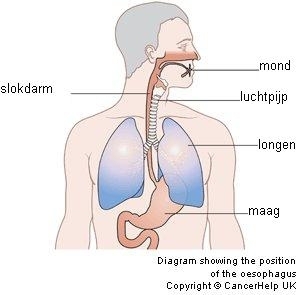Oesophageal cancer

What is it?
What is it?The oesophagus is a part of the digestive system that starts at the top in the pharynx to end on the other side at the stomach. At the bottom end of the oesophagus there is a sphincter that closes to prevent the stomach contents from coming up into the oesphagus (reflux).
Oesophageal cancer is a type of cancer of the oesophagus. It is usually an adenocarcinoma or squamous cell carcinoma of the oesophageal mucosa.
Possible causes
Possible causesSmoking and excessive alcohol consumption remain one of the most common causes of oesophageal cancer. Other possible risk factors include:
- chronic acid reflux (which leads to Barret's oesophagus)
- obesity
- poor dietary habits
Symptoms
SymptomsTypical symptoms are swallowing disorders and pain. Trouble swallowing is recognisable because drinking is no problem, but hard and dry food are difficult to swallow when eating. If food cannot pass, it is often regurgitated or vomited back up
Other symptoms may include hoarseness and a chronic cough, weight loss, pain in the chest and vomiting blood.
How is the diagnosis made?
How is the diagnosis made?Once oesophageal cancer has been diagnosed, it is important to gain an optimum understanding of the extent of the disease by determining the stage of the disease as correctly as possible. This information determines the choice of treatment and the prognosis.
Usually, there is a gradual growth with damage to part of the oesophageal wall and then the entire wall. When cancer cells become detached from the original tumour and penetrate deep enough to reach the blood and lymph vessels, they can escape and colonise glands. If a detached clump of cancer cells nest within another part of the body, the cancer is said to have spread or metastasised. Oesophageal cancer cells sometimes end up in other organs.
The stage is determined based on a globally used classification, the TNM classification (Tumour Nodus Metastasis classification), which looks at the degree to which the tumour has passed through the oesophageal wall (T), whether or not the lymph nodes are affected (N) and whether or not it has metastasised (M).
Treatment
TreatmentThe treatment of oesophageal cancer is complex and entails a specialised team. The most commonly used treatments are oncological surgery, radiotherapy and chemotherapy. Clinical trials can offer a way out sometimes and give you access to cutting-edge treatments.
Treatment centres and specialisations
Treatment centres and specialisationsLatest publication date: 02/08/2024
Something wrong or unclear on this page? Report it.







